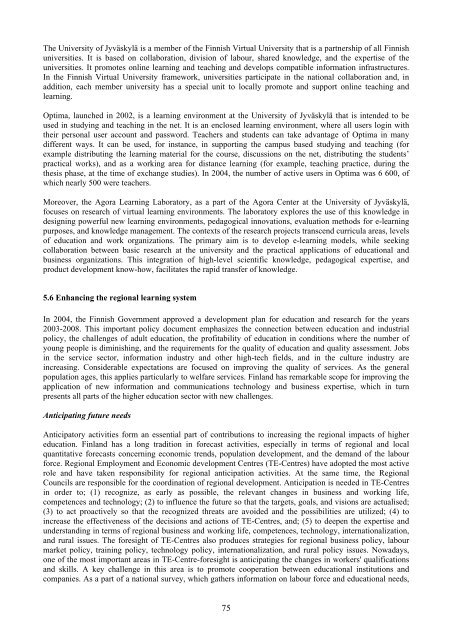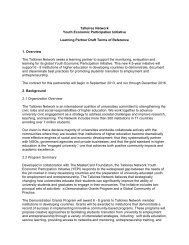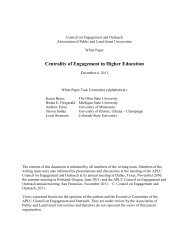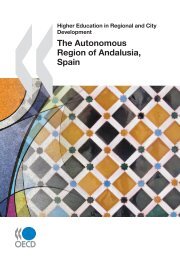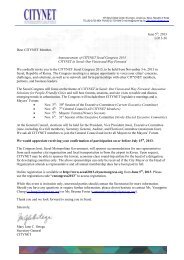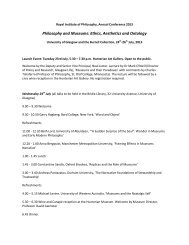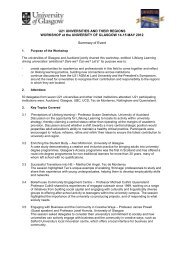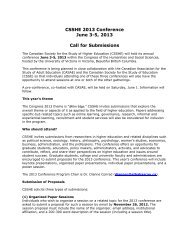The University of Jyväskylä is a member of the Finnish Virtual University that is a partnership of all Finnishuniversities. It is based on collaboration, division of labour, shared knowledge, and the expertise of theuniversities. It promotes online learning and teaching and develops compatible information infrastructures.In the Finnish Virtual University framework, universities participate in the national collaboration and, inaddition, each member university has a special unit to locally promote and support online teaching andlearning.Optima, launched in 2002, is a learning environment at the University of Jyväskylä that is intended to beused in studying and teaching in the net. It is an enclosed learning environment, where all users login withtheir personal user account and password. Teachers and students can take advantage of Optima in manydifferent ways. It can be used, for instance, in supporting the campus based studying and teaching (forexample distributing the learning material for the course, discussions on the net, distributing the students’practical works), and as a working area for distance learning (for example, teaching practice, during thethesis phase, at the time of exchange studies). In 2004, the number of active users in Optima was 6 600, ofwhich nearly 500 were teachers.Moreover, the Agora Learning Laboratory, as a part of the Agora Center at the University of Jyväskylä,focuses on research of virtual learning environments. The laboratory explores the use of this knowledge indesigning powerful new learning environments, pedagogical innovations, evaluation methods for e-learningpurposes, and knowledge management. The contexts of the research projects transcend curricula areas, levelsof education and work organizations. The primary aim is to develop e-learning models, while seekingcollaboration between basic research at the university and the practical applications of educational andbusiness organizations. This integration of high-level scientific knowledge, pedagogical expertise, andproduct development know-how, facilitates the rapid transfer of knowledge.5.6 Enhancing the regional learning systemIn 2004, the Finnish Government approved a development plan for education and research for the years2003-2008. This important policy document emphasizes the connection between education and industrialpolicy, the challenges of adult education, the profitability of education in conditions where the number ofyoung people is diminishing, and the requirements for the quality of education and quality assessment. Jobsin the service sector, information industry and other high-tech fields, and in the culture industry areincreasing. Considerable expectations are focused on improving the quality of services. As the generalpopulation ages, this applies particularly to welfare services. <strong>Finland</strong> has remarkable scope for improving theapplication of new information and communications technology and business expertise, which in turnpresents all parts of the higher education sector with new challenges.Anticipating future needsAnticipatory activities form an essential part of contributions to increasing the regional impacts of highereducation. <strong>Finland</strong> has a long tradition in forecast activities, especially in terms of regional and localquantitative forecasts concerning economic trends, population development, and the demand of the labourforce. <strong>Region</strong>al Employment and Economic development Centres (TE-Centres) have adopted the most activerole and have taken responsibility for regional anticipation activities. At the same time, the <strong>Region</strong>alCouncils are responsible for the coordination of regional development. Anticipation is needed in TE-Centresin order to; (1) recognize, as early as possible, the relevant changes in business and working life,competences and technology; (2) to influence the future so that the targets, goals, and visions are actualised;(3) to act proactively so that the recognized threats are avoided and the possibilities are utilized; (4) toincrease the effectiveness of the decisions and actions of TE-Centres, and; (5) to deepen the expertise andunderstanding in terms of regional business and working life, competences, technology, internationalization,and rural issues. The foresight of TE-Centres also produces strategies for regional business policy, labourmarket policy, training policy, technology policy, internationalization, and rural policy issues. Nowadays,one of the most important areas in TE-Centre-foresight is anticipating the changes in workers' qualificationsand skills. A key challenge in this area is to promote cooperation between educational institutions andcompanies. As a part of a national survey, which gathers information on labour force and educational needs,75
the TE-Centre of Central <strong>Finland</strong> annually publishes industry specific reports covering the prospects ofCentral <strong>Finland</strong>.Box 5.3 OPTIIMI – a tool for mapping the regional needsThe learning network of Central <strong>Finland</strong> – OPTIIMI was started in 2004 to map out the future needs ofthe labour force and to support networking, the creation of innovations, and new business ideas inCentral <strong>Finland</strong>. The project’s operative team consists of representatives from the Jyväskylä Polytechnic,the University of Jyväskylä, Jyväskylä Vocational Institute, Technical Research Institute of <strong>Finland</strong> -VTT Processes, Jyväskylä Science Park, and the <strong>Region</strong>al Council of Central <strong>Finland</strong>. The different subregionsof Central <strong>Finland</strong> will prepare sub-regional expertise programmes leading up to 2008. Theseprogrammes offer information on the objectives, the specific strengths and needs of each region, andspecial attention is paid to the development needs of education and research activities from the point ofview of firms and industries. OPTIIMI is considered to be a very useful tool for regional developmentand its role in the field of lifelong learning is also significant through the contributions it makes to a morecoordinated mode of action, which then supports the collaboration between Central <strong>Finland</strong>’smunicipalities.Cooperation between central and peripheral areasThe University of Jyväskylä and Jyväskylä Polytechnic are located in the city of Jyväskylä, but theycontribute to the development of the whole sub-region of Jyväskylä and the district of Central <strong>Finland</strong> aswell. The Jyväskylä Polytechnic has two small operating units located outside of the Jyväskylä region, in themunicipalities of Jämsänkoski and Saarijärvi (totalling about 400 students) and it organizes needs-basedtraining programmes (bachelor level), or other kinds of courses, in the other municipalities of Central<strong>Finland</strong>. The University of Jyväskylä set up a cooperative initiative with the municipalities of Northern-Central <strong>Finland</strong> in 2003. It was an important educational opening, designed to strengthen the role of theUniversity in the development of those municipalities. The Open University of Jyväskylä is activelyoperating (e.g., with the use of streaming video chat) in the whole of Central <strong>Finland</strong> as it has several partnerinstitutions in the province. The learning network OPTIIMI also promotes the interaction between the centraland peripheral areas of Central <strong>Finland</strong>, acting as an intermediary between them.Dynamic education modules adapting to regional needsThe life-long learning and flexible education programmes are, for the most part, the principal means torespond to the evolution of the business and industry structure, and the changes in production and workingmethods. The Master’s programmes of the University of Jyväskylä and the Retraining and gradingqualifications provided by both the University and the Jyväskylä polytechnic are exemplary forms of theregional orientation and dynamic organization of education.The University of Jyväskylä offers several Master’s Programmes that have been created to enhancemultidisciplinary approaches (see Appendix 14 for the list of Master’s programmes currently running). Theseare all degree programmes leading to Master’s degrees. The entry requirement is a lower (Bachelor’s)degree, other prior university studies, a polytechnic degree or a vocational college diploma. Special Master’sprogrammes increase the flexibility of university studies and their supply should be dictated by demands ofthe working life. The Ministry of Education stresses that the programmes should be connected to theuniversities’ overall strategy and designed to be permanent programmes, with clear, long-term objectives.The University of Jyväskylä can be seen as a pioneer in building Master’s Programmes. The cooperationbetween the University of Jyväskylä and the various regional actors was strengthened in 1995-2000 with thelaunch of the region’s first Master’s Programmes funded by the EU Structural Funds. The Master’sProgrammes in the field of information technology have significantly contributed to the development of thefield in the Jyväskylä region; for example, the Faculty of Information Technology was founded in 1998 andthe Agora building opened in 2000, and ICT company Nokia started its operations in Jyväskylä in 1999.(Puukka, 2004.) In the Jyväskylä region, the basic aim of Master’s programmes has been to achieve a moreeffective transfer of knowledge from education and research to the use of regional actors. According to the76
- Page 1 and 2:
OECD/IMHE ‐ Supporting thecontrib
- Page 3 and 4:
SUMMARYTogether with 13 other regio
- Page 5 and 6:
8.2 Increasing the regional effecti
- Page 7 and 8:
I INTRODUCTION1.1 Strengthening the
- Page 9 and 10:
development. The aim is that region
- Page 11 and 12:
The self-evaluation considered here
- Page 13 and 14:
densely populated cities in Finland
- Page 15 and 16:
1,9 %1,7 %1,5 %1,3 %Population chan
- Page 17 and 18:
The share of jobs in primary produc
- Page 19 and 20:
New pillars of future’s developme
- Page 21 and 22:
Jyväskylä0,60,91,11,0Central Finl
- Page 23 and 24:
2.4 Governance StructureMunicipalit
- Page 25 and 26: of its development outside the cent
- Page 27 and 28: III CHARACTERISTICS OF THE HIGHER E
- Page 29 and 30: continuing education and open unive
- Page 31 and 32: The Science and Technology Policy C
- Page 33 and 34: 3.2 Regional dimension within the n
- Page 35 and 36: order to respond to the challenges
- Page 37 and 38: 14001200Master's degreesDoctoratesN
- Page 39 and 40: 900800Youth graduatedAdult graduate
- Page 41 and 42: provide information for the basis o
- Page 43 and 44: CabinetParliamentSTPCSteering (andf
- Page 45 and 46: 5,04,0Billion euros3,02,01,00,083 8
- Page 47 and 48: The number of refereed articles is
- Page 49 and 50: Centre of expertisePaper industryBi
- Page 51 and 52: The Institute for Environmental Res
- Page 53 and 54: and systematic gradually progressin
- Page 55 and 56: are seen to be very important chann
- Page 57 and 58: Internal support units of HEIsThe F
- Page 59 and 60: of interviewed HEI staffs, the coop
- Page 61 and 62: areas of the region’s Centre of E
- Page 63 and 64: system of Jyväskylä and the HEIs
- Page 65 and 66: V CONTRIBUTION OF TEACHING AND LEAR
- Page 67 and 68: esources to establish new activitie
- Page 69 and 70: The main problem for the Finnish la
- Page 71 and 72: longer. 2.5% of the Jyväskylä Pol
- Page 73 and 74: activities. As a part of the new qu
- Page 75: education programmes consisting of
- Page 79 and 80: practices in the provision of educa
- Page 81 and 82: Reason forskillupgradingDescription
- Page 83 and 84: Strengths+ HEIs are actively confro
- Page 85 and 86: taxation, to lower the unemployment
- Page 87 and 88: Box 6.2 The WIRE -projects: Support
- Page 89 and 90: indoor ice-skating rink, the Rauhal
- Page 91 and 92: The School of Cultural Studies at t
- Page 93 and 94: the number of registered customers
- Page 95 and 96: Box 6.9 Environmental management in
- Page 97 and 98: Strengths+ The significance of HEIs
- Page 99 and 100: eferring to the regional developmen
- Page 101 and 102: Key topics relating to changes in t
- Page 103 and 104: participation in the decision makin
- Page 105 and 106: in the strategy-making process. The
- Page 107 and 108: 7.5 Critical points in promoting th
- Page 109 and 110: 7.Cooperation in strategies concern
- Page 111 and 112: egion is according to national and
- Page 113 and 114: oundaries for further developmental
- Page 115 and 116: joining resources and operations by
- Page 117 and 118: Discussion proposal 15: To ensure d
- Page 119 and 120: achieved by the horizontal utilizat
- Page 121 and 122: Appendix 2 Information on data used
- Page 123 and 124: and finding synergy between the oth
- Page 125 and 126: School of BusinessRoleThe School of
- Page 127 and 128:
The challenge of the school from re
- Page 129 and 130:
developing wellness and environment
- Page 131 and 132:
Faculty of EducationRoleThe Faculty
- Page 133 and 134:
and/or graduation thesis is a signi
- Page 135 and 136:
Areas of strength and prioritising
- Page 137 and 138:
Agora Center’s partners from the
- Page 139 and 140:
Currently the priority of ITRI’s
- Page 141 and 142:
Weak spots and areas to develop in
- Page 143 and 144:
Employment and Economic Development
- Page 145 and 146:
Appendix 3 Analysis of the most sig
- Page 147 and 148:
Appendix 4 Regional effects (input-
- Page 149 and 150:
The overall value of production cre
- Page 151 and 152:
Appendix 5 Reform of regional struc
- Page 153 and 154:
Appendix 7 Provision of education i
- Page 155 and 156:
Appendix 8 Statistical information
- Page 157 and 158:
Appendix 10 Statistics on financing
- Page 159 and 160:
Appendix 12 Labour market activity
- Page 161 and 162:
Appendix 14 Master’s Programmes a
- Page 163 and 164:
Uusiutuvan energian tutkimusohjelma
- Page 165 and 166:
BIBLIOGRAPHYAcademy of Finland (200


